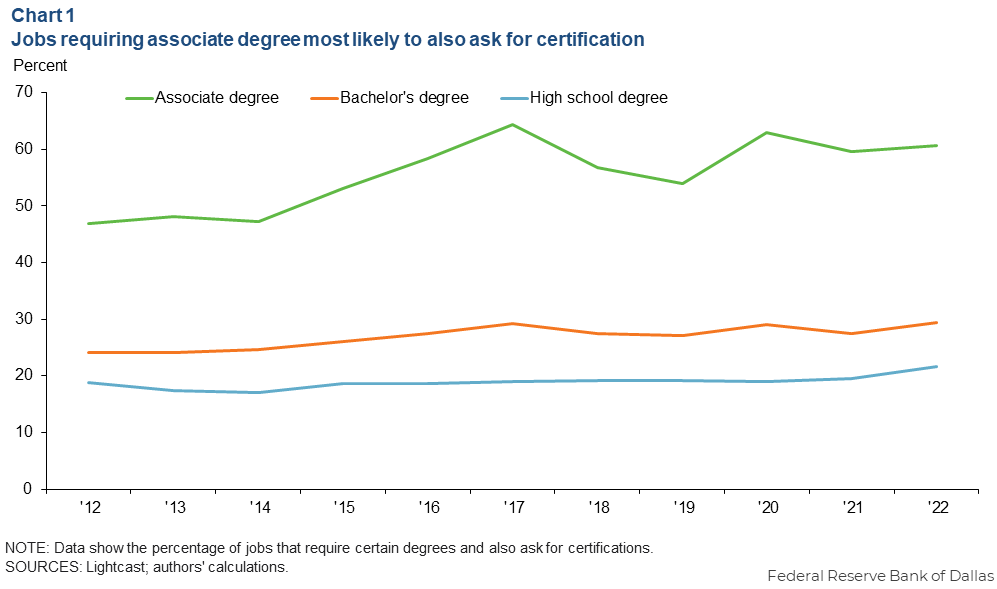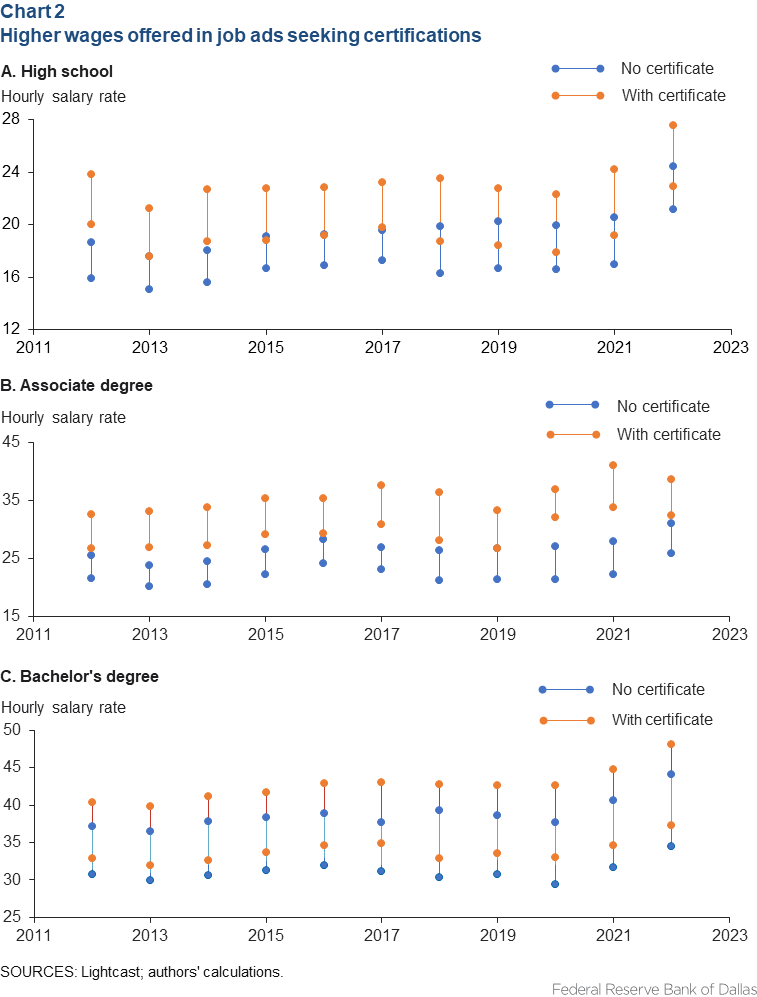
Job seekers with associate degrees likely to benefit from short-term credentials
Many states, including Texas, have recently created initiatives that prioritize short-term credentials—postsecondary programs that take fewer than two years to complete. These initiatives are often designed as an alternative to college and targeted to students who do not have a four-year degree. The first article in our series found that supply of and employer demand for short-term credentials has gone up in the past several years. But does this rise in demand favor the same population that these programs are targeting? That is, does the demand for these credentials benefit those without a four-year degree?
To help answer this question, we begin by examining how often credentials are mentioned in addition to degrees for different educational attainment groups. We use the Lightcast data set of job postings to examine employers’ demand for certifications within three groups: postings that seek candidates with bachelor’s degrees, those that require associate degrees and those that require high school degrees or the equivalent. Chart 1 shows that job postings seeking candidates with associate degrees are about twice as likely to ask for certifications as those that require bachelor’s degrees. Jobs requiring a high school degree are even less likely to ask for a certification.

While the shares of postings seeking certifications have risen for all three education groups, demand for certifications increased the most for jobs requiring an associate degree. Interest in certifications has grown more slowly for postings requiring a four-year degree, and employer demand for certifications combined with a high school degree has only increased meaningfully in the last two years. While this growth could continue, as of 2022, just 22 percent of jobs requiring a high school diploma (or equivalency) also sought a certification, well below the 61 percent of jobs that required an associate degree and also sought a certification.
Certifications associated with higher wage offers
Employers may be more interested in candidates with certifications, but are these candidates compensated for having one? After all, while short-term credential programs are shorter and cheaper than degree-granting programs, they still require time, effort and tuition.
We use the same three educational attainment categories to look at whether certifications are accompanied by a higher wage offer. An important caveat is that our dataset includes advertised wages, not necessarily actual wages. In Charts 2A–C, we show the average hourly wages advertised in postings that require a certification, and postings that do not.
For each group of jobs, there is a minimum and maximum hourly wage, indicated by endpoints on each line. For example, in Chart 2A, the orange line over the year 2012 shows that job postings asking for a high school graduate with a certification paid an average minimum of $20 per hour and an average maximum of $24 per hour.

Two takeaways emerge from these charts. First, jobs requiring associate degrees offer the largest increase in wages for certifications. These jobs provide an average bump of $7 in minimum hourly salary and an average bump of $9 in maximum hourly salary. The bump is less for jobs seeking bachelor’s degree holders ($3 in minimum and $4 in maximum hourly salary) and high school degree holders ($2 in minimum and $4 in maximum hourly salary).
It is important to note that the wage gap between those with and without credentials can emerge from potential differences in skills and experience that accompany those credentials. For example, some certifications are only achievable with minimum years of experience. To mitigate the influence of those factors on the wage gap, we conducted further analysis using self-reported wage and credential status from the Current Population Survey. The results of that analysis are largely consistent with the findings in Charts 2A–C. This implies that the bonus of credentials does indeed exist even when controlling for a variety of additional factors that are correlated with experience and skill.[1] Still, there are likely other factors at play here, including industry and occupation type, that we will elaborate on in the third installment of this series.
Nevertheless, the second takeaway is that jobs requiring a four-year degree, with or without an added certification, generally pay better. By comparing Chart 2B and Chart 2C, we see that jobs requiring a four-year degree typically advertise higher pay than jobs requiring associate degrees.
Short-term credentials offer a boost, but benefits fall short of college degrees
This article shows that employer demand for certifications is greatest among jobs that require an associate degree. These jobs also tend to pay the highest premium for certifications compared with jobs requiring a bachelor’s or high school degree. Still, job postings requiring a bachelor’s degree usually pay the highest, regardless of whether they require a certification.
Importantly, we find that employers currently have relatively low demand for job candidates with a high school degree and certification. To ensure the success of short-term credential initiatives, employers and educators may need to collaborate further to align employers’ needs with the skills and knowledge of participants in these programs.
However, there are other factors at play that can refine our results further. For instance, certifications could benefit certain workers depending on their occupation. The next article in our series adds occupation to the mix to determine where the most opportunity for such a benefit lies.
Note
- We conduct an analysis using Current Population Survey data by holding constant age, gender, race and ethnicity, marital status, education, experience and economic factors related to the calendar year, like inflation. After eliminating these factors, we find that the average wage difference for certificate holders is about $5,000 more a year for associate and high school degree holders and only $2,600 more for college degree earners. This is consistent with the finding in Lightcast that those without a college degree benefit from holding a credential.
About the authors






